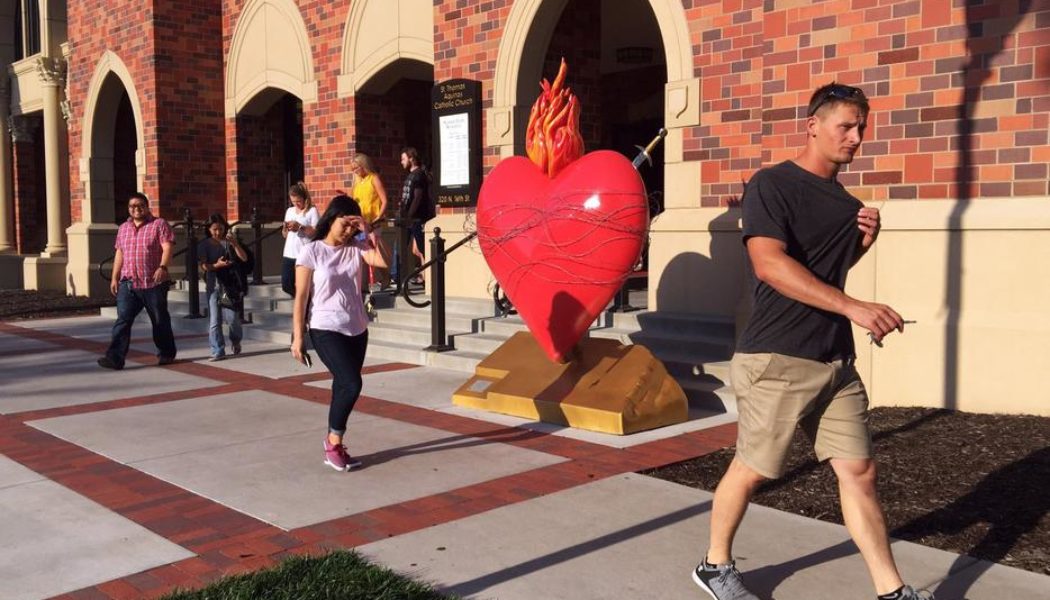
Know your faith, toughen up, make good friends — and love Jesus Christ with all your heart, soul, mind and strength
As students return to college or go to college for the first time this fall, I would like to offer a few suggestions about how to stay Catholic in college. As it happens, I would suggest these same principles to anyone else as helpful practices for holding on to your faith.
1. Know your faith! I grew up going to a Catholic Church, but hardly anything sank in. I was like a sitting duck for people to come and explain to me what was wrong with Catholicism. The problem was that the picture they painted was a caricature, what’s known as a “straw man” in logic. Had I known what the Church really taught, I would have been able to answer any objection levelled against it.
On this point, I would like to report an observation I have made. I have heard many stories of people who were very well educated in philosophy or their own faith who converted to Catholicism when they learned about it. I have never heard an ex-Catholic who could adequately explain the Catholic faith. Venerable Fulton Sheen accurately said, “There are not one hundred people in the United States who hate the Catholic Church, but there are millions who hate what they wrongly perceive the Catholic Church to be.”
Therefore, I cannot recommend highly enough a diligent study of Scripture and the Catechism of the Catholic Church. The YouCat is also a very helpful summary of the Catechism, and it is written in more contemporary language. There is beauty and genius in the teaching of the Church, but it takes work to be able to see it.
2. Don’t fall for bad atheist arguments against a God the Church doesn’t believe in. God is not who they think he is or even you think he is. There are many, many cartoon versions of God that are easily shot down. The God described and rejected by the militant atheists is simply not the God of Catholicism. This point is closely related to the first. Simply put, we cannot wrap our minds around God. If you meet someone who says he understands God, you can be sure that he does not understand him. St. Augustine wrote, “If you understand it, it is not God.” Even most philosophy professors do not know about the high level idea of God taught by the Church.
3. Learn the arguments for God’s existence. Philosophy professor Ed Feser came to believe in God through the philosophical arguments he was teaching his students. The fact is that we can know that God exists; that point is not a mere matter of faith. Learning the arguments also will help you get a grasp of the God Catholic theology describes. I recommend Fradd and Delfino’s book Does God Exist (which is also a useful primer on philosophy) and Kreeft and Tacelli’s Handbook of Christian Apologetics (a volume that belongs in every Christian home).
4. Find like-minded Catholics. There is a very good chance that there is a Catholic ministry on your campus. Get involved right away. The people you spend time with will have a dramatic impact on what you do and who you become. This is true anywhere, but especially in college as you are on your own for the first time and spreading your wings of independence. There is no such thing as a lone-ranger Christian. Hanging out with other Catholics will also help with all of the other suggestions I am making.
Another aspect of this suggestion is the time you should spend with the saints. Read books by and about them. The joy practically drips from the pages. You will learn a lot. You will be inspired. You can even talk to them as you read. They are the ultimate Catholic fellowship. And, of course, don’t forget to “call” your Mother — Mary, the queen of the saints.
5. Don’t let yourself be fooled or made to feel bad by rhetoric. In society today, it often happens that you will be made to feel like a villain if you don’t buy into the dominating ideologies and agendas associated with liberal morality. First of all, sound rational thought leads to the same conclusions as the Church on moral issues. You don’t have to be a Christian to agree with the Church; you just have to know the philosophical basis of morality, a theory known as natural law. Secondly, all of God’s commandments come to us through and because of his love. Real, tough-as-nails, self-sacrificing love is the source of God’s precepts. If they don’t seem to make sense, it is because you don’t understand real love, real human nature, or the heart of your loving Father.
6. Last of all, but most important, put your relationship with Jesus first. Nothing in life, absolutely nothing, is more important than a personal relationship with Jesus Christ. This must be fostered through prayer and the sacraments. Go regularly to Mass and Confession. Get into a good schedule early and don’t give up on it, even when you fail (and you will!). Throw yourself on the mercy of God. When you make a mistake (not IF you make a mistake), turn back to God again and again if you have to. He didn’t give up on you, and he won’t give up on you. In the end (and the beginning), Catholicism is not about a set of beliefs or practices, but about a Person, Jesus Christ. This encounter is the purpose of everything else you ever do.
Join Our Telegram Group : Salvation & Prosperity






![A ‘perfect’ chocolate chip cookie and the chef who created it [scroll to end of article for recipe]…](https://salvationprosperity.net/wp-content/uploads/2020/10/a-perfect-chocolate-chip-cookie-and-the-chef-who-created-it-scroll-to-end-of-article-for-recipe-327x219.jpg)

